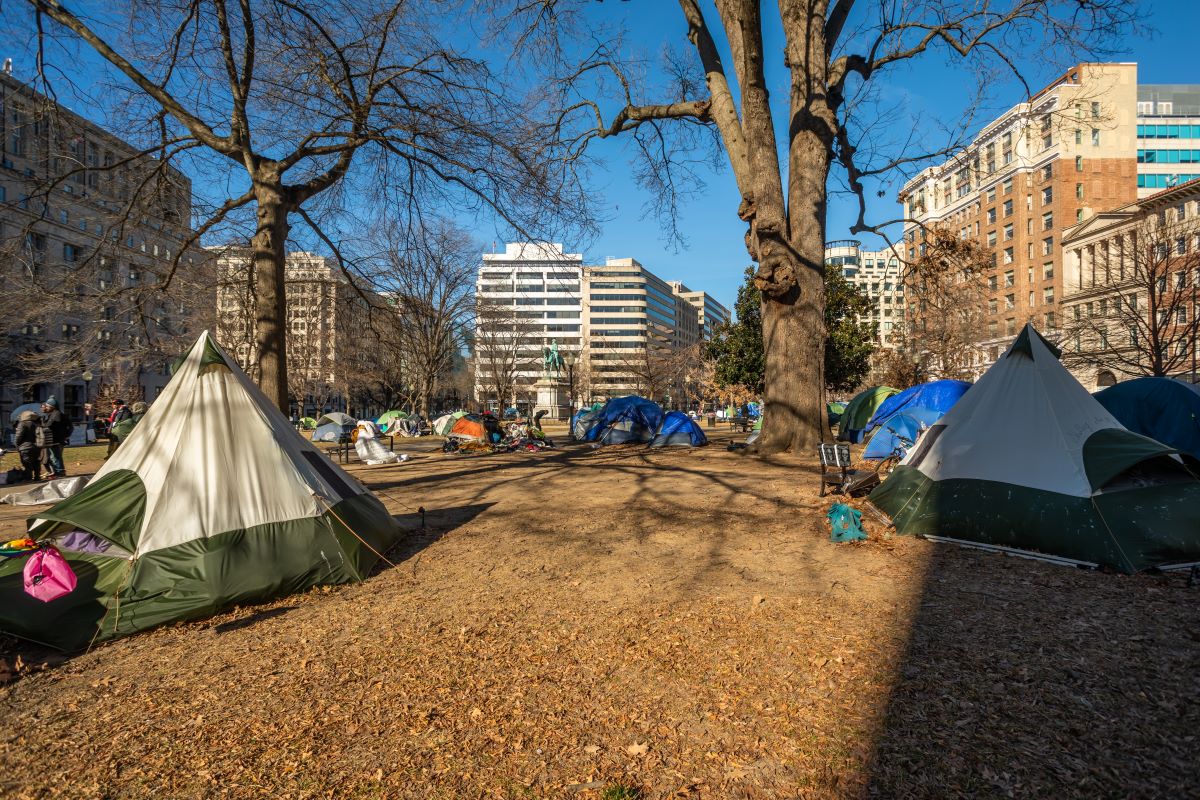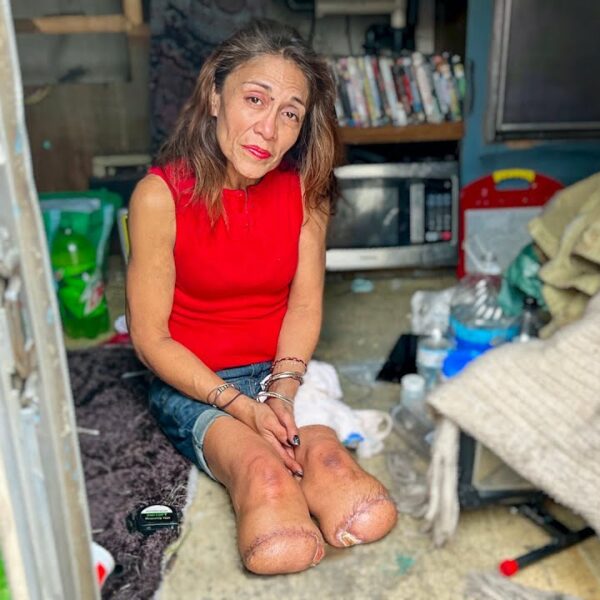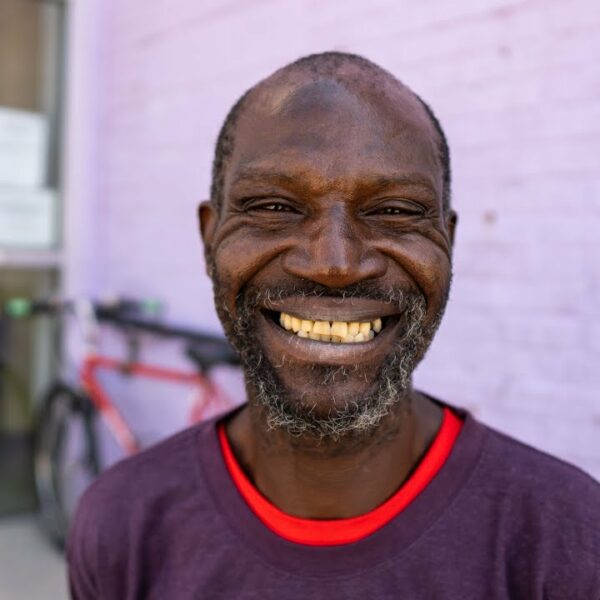Homeless People That Were ‘Offered Assistance’ Are Back on the Streets Already
On February 15, 2023, housing advocates were outraged, and homeless encampment residents were devastated. The reason? The homeless encampment situated in McPherson Square, just a stone’s throw away from the White House where President Biden promised to take on a Housing First Initiative, was being cleared, an action sometimes referred to as sweeping.
What is an Encampment Clearing or Sweep?
Don’t be fooled by the name. There is nothing clean about clearing or sweeping an encampment where homeless people reside.
Indeed, it is a dirty practice designed to deceive the public into thinking there is less homelessness in an area because said homelessness is swiftly made less visible through brute force and unjust legislation. This shifty practice usually functions in tandem with law enforcement officials, who use their ever-growing collection of anti-camping ordinances to forcibly remove encampment residents. It is often under the guise that they will be offered better options once they’re robbed of their worldly possessions and makeshift shelters.
In truth, this is little more than a ruse. Data suggests that once the tents are left to rot in landfills, and all of the life-saving medications and vital identifying documents are destroyed, encampment residents are left with pocketfuls of empty promises, not to mention countless citations and exorbitant court fees.
Individuals are seldom offered permanent supportive housing in return for having their makeshift shelters demolished. Most will not even receive temporary placement on the cots of local rat-infested warming centers or shelter-like facilities.
They will simply be moved to another corner of the United States and forced to start all over again with fewer resources than before.
Sweeps Make Existing While Homeless a Crime
WUSA9 News reports that during the most recent sweep of McPherson Square, at least two arrests were made. Encampment residents were not only subject to great loss in terms of material possessions and general dignity. They were also cited for existing while homeless, a term that refers to the criminalization of homeless people engaging in acts of survival. In this case, the act was refusing to take down their tents and move to what was presumably not a permanent housing opportunity.
Two Lies Are Being Told: The Reason for the Sweeps and the Projected Outcomes of Police Involvement
The Deputy Mayor for Health and Human Services (DMHHS) and The National Park Service claim they cleared the encampment as a matter of public health and safety. But the data does not support that claim.
While officials attempted to slander encampment residents, citing the tent city as a growing source of crime, studies suggest that there is absolutely no correlation between the growth of homeless encampments and any increase in citywide crime.
To quote Quantifying Sociologist Charles Lanfear, who explained the phenomenon in a riveting interview with NPR:
“On average, an increase in the number of tents and structures in an area is not associated with any increases in property crime — very close to zero.”
One of the main reasons the general public conflates tent cities with an increase in crime is the very fact that sweeps like this one happen, and they often occur with a heavy police presence. This approach creates the illusion of a confirmation bias.
The general public perceives tent city residents as criminals. Then, when they turn on their televisions, what do they see but houseless people in tent cities being hauled off in handcuffs? These shifty politicians are leaving out that the encampment residents are being arrested most frequently for “quality-of-life violations,” which are merely the laws that criminalize existing while homeless.
The second lie is more devious. It is the idea that any houseless person who stays put during an eviction is “service-resistant.” For example, during the McPherson Square debacle, the National Park Service issued the following statement to explain the arrests. According to their accounts, the following alleged scenario took place:
“Two people, who both declined any social service assistance offered by the District of Columbia Department of Behavioral Health, ultimately refused to leave the park and were arrested shortly after 3 p.m. for violating the closure of the park.”
This statement implies that there were services available for the two arrested individuals to take advantage of and that they irrationally declined. If that were true, if all these resources were being offered, then why are more than two-thirds of former McPherson Square Encampment residents already back living unsheltered on the city streets?
The Washington Post reports that the Day After the Sweep, the Vast Majority of Encampment Residents Were Already Back Living on the Streets
The fate of the aforementioned encampment residents was not radically different from other tent cities’ “closures,” “cleanups,” or “sweeps.”
Despite proclamations of acting on behalf of public safety and accusatory language surrounding anyone who opposed such action, practically nothing was done to end homelessness for the 74 + individuals who were tossed out of the square.
According to the Washington Post, at least two-thirds of encampment residents were homeless the next day. Approximately 23 people were offered temporary shelter. Data suggests that a month and a half later, even those individuals who received temporary aid from case workers are back to living unsheltered, presumably, in even worse conditions than before.
One evicted encampment resident named Brenda was still waiting for the city to reimburse her for a hotel room she rented the night her tent got torn down. Another evicted encampment resident named Lisa says she was initially promised accessible overnight accommodations for her wheelchair, but service workers never followed up.
In the case of the McPherson Square encampment clearings, the only successful thing that happened was the arrests. They seem to have gone off without a hitch. It is almost as if that was the whole point.
Talk to Your Legislators About Drafting Actionable, Non-Punitive Solutions to the Homeless Crisis
Nobody should have to live outside in a tent. Those of us who advocate against encampment sweeps are doing so on behalf of the residents, not the residencies.
There is a simple solution to the problem at hand. It is making housing a human right for all and creating an environment where tent cities don’t exist because they don’t have to.
Talk to your legislators about drafting laws that make it possible for everyone to have a safe, permanent, and affordable home.













